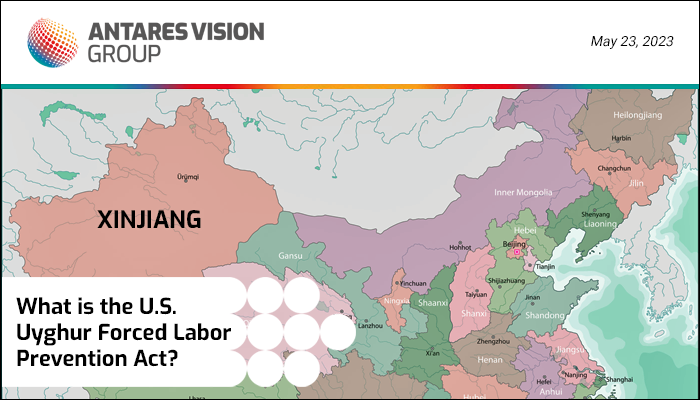Signed into law on Dec. 23, 2021, the U.S. Uyghur Forced Labor Prevention Act (UFLPA) prohibits the importation of certain goods into the United States and aims to ensure that businesses are not complicit in human rights abuses. It’s one of many regulations around the world that aim to make supply chains more ethical, transparent, and sustainable.
Let’s see what the act says and examine why supply chain transparency is the key to making such legislation viable and successful. For another example of recent laws, see our blog post about Germany’s Supply Chain Due Diligence Act.
What is the Uyghur Forced Labor Prevention Act?
The Uyghur Forced Labor Prevention Act, or UFLPA, is a response to concerns over forced labor and human rights violations in the Xinjiang Uyghur Autonomous Region in northwest China.
It’s worth quoting the U.S. Customs and Border Patrol website at length for a thorough description. It says the act:
“establishes a rebuttable presumption that the importation of any goods, wares, articles, and merchandise mined, produced, or manufactured wholly or in part in the Xinjiang Uyghur Autonomous Region of the People’s Republic of China, or produced by certain entities, is prohibited by Section 307 of the Tariff Act of 1930 and that such goods, wares, articles, and merchandise are not entitled to entry to the United States.
“The presumption applies unless the Commissioner of U.S. Customs and Border Protection (CBP) determines that the importer of record has complied with specified conditions and, by clear and convincing evidence, that the goods, wares, articles, or merchandise were not produced using forced labor.”
Furthermore, the act required the Forced Labor Enforcement Task Force, chaired by the U.S. Department of Homeland Security, to develop a strategy for supporting the legislation. This strategy was published on June, 1, 2021, and includes the UFLPA Entity List, which names “entities in Xinjiang that mine, produce, or manufacture wholly or in part any goods, wares, articles and merchandise with forced labor.”
Key provisions
The Uyghur Forced Labor Prevention Act has provisions to combat forced labor and enhance supply chain transparency, including:
-
-
- Import restrictions: As we noted above, the act bans the importation of goods produced wholly or in part in China’s Xinjiang Uyghur Autonomous Region, unless importers can provide clear and convincing evidence that the goods were not produced with forced labor.
- Enhanced due diligence: The act places the responsibility on companies to exercise due diligence and conduct comprehensive risk assessments of their supply chains to identify any forced labor risks or links to Xinjiang.
- Publicly available information: Companies must disclose information on their efforts to ensure their supply chains are free from forced labor, including the specific measures they have implemented and the results of their due diligence assessments.
- Coordination with government agencies: The act requires collaboration between government agencies, including the Department of Homeland Security, Department of Labor, and Department of State, to ensure effective enforcement and implementation of the legislation.
-
Implications and challenges for businesses
The act has very real implications for businesses operating in the United States. They must have the means to see into their partners’ operations, as well as into the often opaque landscape of secondary and tertiary suppliers. Other challenges include:
-
-
- Not being able to produce audits that meet Forced Labor Enforcement Task Force credibility requirements
- Traceability challenges in the supply chain (e.g., aggregated and commingled products with difficult-to-prove provenance)
- Regulations in other countries that make compliance more difficult/complicated
- Challenges related to sourcing (i.e., not being able to find a crucial raw material or item outside of China)
-
The government provides resources for businesses concerning the Uyghur Forced Labor Prevention Act. For example, see the U.S. Customs and Border Protection’s UFLPA Operational Guidance for Importers and its FAQs about the act.
Final thoughts
The Uyghur Forced Labor Prevention Act is part of broader regulatory efforts to eliminate forced labor and human rights abuses in global supply chains. Businesses must be prepared (and willing) to audit and assess their operations, engage with their suppliers (and their suppliers’ suppliers), and establish mechanisms to trace the origin of goods to ensure compliance.
And they should be proactive about it. A first step is contacting us to talk about supply chain transparency. Our transparency solutions enable companies to track and trace their supply chains in real time from virtually anywhere in the world. Our technology makes every product a “digital asset” with a certified, provable, and sharable provenance. We can show you how it works with a short demo.
If you’re interested in learning more about supply chain transparency, check out the articles below. “Transparency” means just about the same thing in every supply chain, so consider these as case studies about how it works, why it’s important, and the business benefits it can bring.
- The Global Seafood Supply Chain and the Importance of Transparency
- Global Seafood Supply Chain Transparency Benefits Everyone
- The Global Seafood Supply Chain: Arguments for Transparency
- Cosmetics Supply Chain Transparency for Business Value and Opportunity





